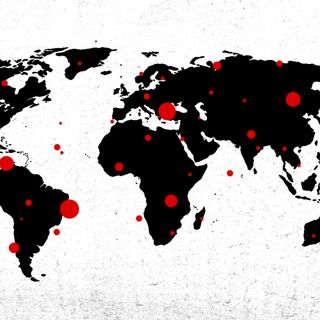In Sri Lanka, haldi (turmeric) is now a hot commodity on the black market to the point that people are exchanging gold for it, due to the spice’s believed ‘immunity-boosting powers’ amid the global pandemic.
Turmeric has been in short supply in the island nation since last December, before the impact of the pandemic was fully realized, when the government banned its import to bolster domestic production. But amid the global health crisis, demand has outstripped supply even more, causing the price of turmeric to surge exponentially — now, a 100 kg bag of smuggled turmeric goes for up to 1 kilogram of gold.
“We’re selling the bags at 60 Indian rupees per kilo and the price in Sri Lanka is 4,000 Sri Lanka rupees per kilo. Naturally, smugglers will capitalize on the situation. Those living in the coastal areas who have access to fishing boats and have the knowledge of cross-border transactions, they can land a bounty even if they secure one or two tons of turmeric,” RKV Ravishankar, president of the Turmeric Merchants Association in Erode district, one of India’s largest turmeric-producing areas, told South China Morning Post.
Reportedly, the modus operandi used for procuring and smuggling cannabis from Tamil Nadu’s coasts into Sri Lanka is being followed for smuggling turmeric as well. Earlier this month, the Indian police seized close to 2,000 kilograms of turmeric intended for smuggling into Sri Lanka. In the past, the Sri Lankan Navy has seized more than 7,000 kilograms of turmeric smuggled into the country illegally.
Related on The Swaddle:
Amid Covid19 Alcohol Ban, Sri Lankans Are Brewing Moonshine
In India, too, there has been a surge in demand for ‘immunity-boosters’ with the AYUSH Ministry recommending a number of them, including turmeric, as “immunity-boosting measures for self-care during Covid19 crisis.” In fact, an Indian survey of 4,000 medical bills issued by pharmacies in June found that 92% were for products containing honey, ginger, probiotics, lemongrass, tulsi (basil), and turmeric, among others — all touted to boost immunity. Even products like the “organic turmeric latte” have begun trending in India amid the pandemic.
In September, Dr. Shafi Kuchay, a senior consultant for endocrinology and diabetes at Medanta Hospital in Delhi had tweeted about seeing a patient with “yellow eyes but no symptoms of any liver disease” because they had “consumed two tablespoons of turmeric with water, three times per day, for the last two-three months … for prevention of Covid19.”
In the meantime, whether turmeric is indeed beneficial for preventing or treating Covid19 remains unverified — even scientific papers promoting its benefits are calling for large-scale, randomized trials to evaluate its efficacy and usefulness against Covid19.
“While using these products in moderation or recommended quantity may not cause any harm, people have started consuming these products without knowing their proper dosage, way of preparation and consumption and their interaction with their ongoing medications. The trend is dangerous,” Dr. Manoj Goel, director of pulmonology at Fortis Memorial Research Institute in Gurugram, told The Print.




